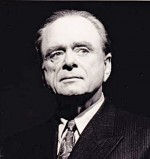Title
“It’s been a long time since I’ve seen it, actually. I think the reading was the first time I’ve sat and listened to the play for probably five or six years.” The speaker is playwright David Auburn, and the “it” he refers to is his Pulitzer Prize-winning play, Proof, which will be performed by the fourth-year drama class this month in the Stephanie P. McClelland Drama Theater.
Body
No stranger to Juilliard, Auburn attended the Drama Division’s Lila Acheson Wallace American Playwrights Program from 1994 to 1996, and although he didn’t write Proof during his time in the program, in a recent conversation with The Journal, he commented on his sense of continuity with the School: “A lot of the students who I worked with as actors when they were in school here later went on to do the play in New York and other places. There’s a nice Juilliard connection—I’m happy to see it get done here.”
This month’s production of Proof will be directed by Harris Yulin. An accomplished actor as well as director, Yulin reunites with the Group 40 actors (he taught them in several master classes last season) as a cast member in Proof, playing the role of Robert.
Having worked together several times in the past (most recently, Yulin directed Auburn’s Amateurs in the Ensemble Studio Theater’s 2010 Marathon of One-Act Plays), Auburn and Yulin—who also took part in the conversation—show an ease with each other as they discuss the inner workings of the play.
While Shakespeare wrote, directed, and acted in his own plays, it is rare to see one person wear so many hats today in American theater. Auburn remarks: “I always wondered how that’s done”—acting and directing at the same time, that is.
Yulin replies, “It’s not as if you are completely immersed … Part of you is, and there’s a part of you that’s watching the whole thing” from a distance.
Proof was first presented Off Broadway in 2000, winning Auburn the Pulitzer Prize, and was turned into a film in 2005. To this day it continues to be performed around the world. The play begins on the back porch of a house in Chicago. Catherine, a young woman of 25, has spent the last several years caring for her mentally deteriorating father, Robert, a mathematical genius who has recently died. Hal, Robert’s former student, is searching through the 103 notebooks Robert left behind in hopes of finding Robert’s last stroke of genius. As Catherine and Hal’s relationship develops, Catherine’s sister, Claire, is trying to plan the next chapter in Catherine’s life. All the while, Catherine struggles to know how much of her father’s genius—and mental instability—she has inherited.
Fourth-year actor Jo Mei, playing the role of Claire, remarks on what rehearsals with Yulin are like. “He dives into the material without any hesitation or self-consciousness, and is always trying new things. I know by his example that that’s what he expects of all of us too.”
And as the discoveries in rehearsal continue, one of the play’s themes in particular seems to stand out for Yulin: the math. “To touch it gingerly is provocative and exciting,” he says. “One wants to know more.”
“Did you study mathematics?” he asks Auburn.
“No,” Auburn answers. “In fact I was always pretty bad at it. I had to take basic math classes in college, never did very well, but I knew a lot of guys who were math people in school, and when I was writing the play I got to know mathematicians, who came in to consult with the [original] cast. That was very useful. We always brought them in in pairs and that was interesting because they would disagree a lot, and argue … to get a sense of the liveliness of the discord was useful for the actors.”
“This idea of having two people coming in at the same time is interesting,” says Yulin. “It’s fascinating … just entering into that world.”
“You don’t really have access [to the play] if you can’t work the math,” Auburn says. “It’s a language, and if you don’t know the language you can only get the very summary of what kinds of problems they’re dealing with. I was drawn to the world of these people and how intellectually engaged they were. Not just with math, but with seemingly everything. They were very lively and passionately committed to whatever the problem was that they were working on. It seemed like a good world to put on stage.”
But Proof is not just about the math, as Auburn explains: “When I was writing the play, the thing that I felt like ended up being at the core of it was this father-daughter relationship. That was sort of the well I could keep returning to when I wasn’t sure where to take the play. To me, that’s the center of the play: what kinds of things do we inherit from our parents? What we would like to inherit, what we would rather not? What do you owe to your parents? What kinds of expectations are coming from them that are either burdensome or inspiring? All that kind of stuff felt key to me.”
There is a plethora of themes and ideas to be extracted from such a well-developed work. When asked to choose one word to describe the play, Yulin couldn’t come up with just one. He said that once, as a student, someone asked him what is the theme of Hamlet. “I said, ‘everything,’ and he said, ‘Wrong, next.’ But I still cling to my feeling. I find it difficult to condense. It seems to me that a good play like this play presents itself in the most economical terms possible. And to condense it further is to somehow violate it in a way. Not that you can’t talk about it, but what it’s about is what it’s about … so we talk about that, and fill it in with our imaginations.”





